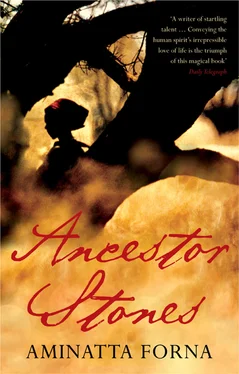My father sent for a doctor. Somebody from the town. The man arrived by bicycle and carried a battered black bag, empty except for a stethoscope. Finda was displeased when he pressed the cold metal disc against my mother’s breast, but she told me after that she did not protest because she knew my father had placed his faith in this man who was taking so much of his money. Under the doctor’s instructions we gave her one tablet, aspirin, each day and every other day Finda rubbed her body with mentholatum from the brown glass jar the doctor brought us from the pharmacist. We waited. My mother grew thinner.
My mother was ashamed of being sick, of the sour smell that rose from her and stained the air. Finda brought star lilies and placed them in my mother’s room and their thick scent mingled with the odour of sickness. As if contaminated by my mother’s shame my father stopped his visits. Instead he arranged for her to visit the hospital in Kamakue. I was not allowed to go, though Finda went and my brothers too.
Idrissa described the big white building, surrounded by walls built of concrete breeze blocks and lawns of spiky grass, walkways wrapped in bougainvillaea and morning glory. I imagined my mother would be happy there, among the flowers. Of course we expected miracles. Finda was the only one who had any doubts. The others of us — her children — imagined our mother would come home restored to the way she was before.
My brother told me how they waited many hours to see the doctor. They were sent away at the day’s end with no choice but to sleep by the side of the road outside the hospital since they did not know a soul in that place. Our mother was weak and her breathing was troubling her. The dust from the road affected her greatly. Eventually a woman offered her a place to stay, though there was not room enough for Idrissa and Finda, who lay down under the eaves. In the morning they returned to resume their place in the queue. When their time came they found they did not understand the doctors’ language, nor they ours. They did not have the words to explain how my mother was so changed she had become another person. The doctors looked her over, made her open her mouth, and peered into the corners of her eyes. When the examination was over an orderly was brought in to translate. The man had a wife from our parts and could speak a little of our language. The beds were full, he explained. They should come back the next week or before that if she turned much worse.
It had taken nearly three days’ travelling to bring her there.
My mother sank into her bed until she merged with the bedclothes. Her spirit shrank and crept away to hide in the dark recesses of the house. For a long time things seemed to stay the way they were. My mother gently fading from life.
Two months passed. I was up early on a moist, warm morning. It had rained the night before and the ragged clouds had cleared from the sky. The sun shone strongly, patches of the ground steamed and the vapours rose up and danced in the sunlight.
Just then I forgot about that dark room and the bitter promise contained inside those walls. I felt happy. Every morning when I woke from dreaming, for a few moments I was peaceful until I remembered, and the sagging feeling returned. Once I saw Finda somewhere away from the house, standing in the street with some of her companions. They were laughing, some foolishness or other. I had walked past quickly, turning my head away. Keeping it turned even when Finda called out to me. But that day, when I noticed the rains were nearly over, I too managed to forget.
I passed my mother’s almond tree at the front of the house. I was responsible for watering it. The leaves looked withered and so I forgot whatever it was I had been doing and I hurried about my neglected chore. As I returned to the same spot I noticed something about the tree. I saw it fleetingly, at first. The leaves were shaking, though the air was quite still, no wind. I saw the trunk, the branches — moving, writhing, darkly flexing like muscles on a labourer’s back. I stopped where I was, afraid to go any closer. It was as though the tree were alive, trying to pull its roots up from the pot. Finda, passing by with a tray of guavas, saw it too. She screamed and it was her scream more than anything else that caused me to start. We both dropped our loads at the same time and I remember how, for a moment, I watched the beads of water and fruit race across the dust like differently sized marbles.
Remember how we used to build our chicken coops high off the ground to protect the hens from the mongoose? In another house a pair of chickens disappeared from their roosts, nothing left but bones and feathers. Not a mongoose. They always gnawed through the cane bars and carried the chickens away. No, not a mongoose. Something else.
And in yet another house something that glistened and boiled black in their cooking pot, where the remnants of a meal had disappeared. The whole compound heard the woman shriek when she raised the lid.
Ants. And ants, too, covering the almond tree, making the branches shimmer and sway before our eyes with their myriad glistening bodies and waving antennae. The two of us carried the pot to the river, it was heavy and the ants crawled up our arms and covered them with fiery bites. We lowered the tree into the water and the ants floated off, struggling on the surface of the water, drowning. Then we dragged the almond tree back to its place and trailed a ring of ash around the base.
It wasn’t as though nobody had ever seen driver ants before. Or lost a chicken or two. You could tell when they were coming, the cockroaches flying ahead of the marching columns trying to save themselves. They infested the roofs of houses and dropped down from the thatch. But the talk began all the same. And the way those people talk, sideways, out of the corners of their mouths, using some words to say what they do not really mean, and other words to say the things they do. And you cannot shout at them: ‘what do you mean? Say what you mean to say!’ Because then they look at you as though you had let the sun get to your head. As though you were a demented dog jumping up to bark at phantoms. You have to force yourself to pretend that what is really there isn’t there at all. You go on with your life.
I heard it from Idrissa first. Idrissa heard it from Finda. I found her some hours later. She was removing the laundry from the bamboo poles where it hung to dry, folding each item neatly and adding it to the pile on her head. She told me not to worry myself about it. It was just foolish talk by superstitious folk.
And I believed her. Just words. I didn’t know then the damage words can do. You can’t feel them, or see them. Someone opens their mouth to speak. The words are there. And then they’re gone. Except of course they’re not, now they’re inside the other person’s head, sticking to their brain. I should have remembered the line from the song my mother sang: words never die.
I know who stirred up the villagers’ imaginings. My father was a Muslim. He disdained such talk. Though you would be mistaken if you thought that meant he did not believe. And even I, in my time I’ve seen some things that could not be explained. The pothos brought in laws against it, and that served to convince people all the more. For who would go to the bother of outlawing something that did not exist? And Pa Yamba, I had seen his box covered in charms and sassa in his back room where I sneaked in once with the other children. He still divined. Only now he lit incense, opened a Koran and chanted words in Arabic to summon the Djinna Musa.
The ants. And the chickens all the way across the other side of the village. And people asked how the ants got to be right in front of her window like that. All over the almond tree that had been my father’s gift. And what about her sickness? Wasn’t that what happened when you double-crossed the spirit that gave you your good luck? Or else you played at something you didn’t understand? Wasn’t she a Madingo? And he, who had younger wives, still so besotted with her for all that time. Not beautiful. Not so clever. Not even from a ruling family. What did she possess to make him want her? Nothing. She was only a woman. The whispers, the truth, the lies, all muddled up until everything became an accusation, in their mouths even the simplest fact sounded like a crime.
Читать дальше












